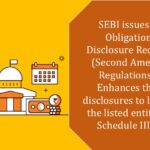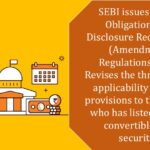The Securities and Exchange Board of India (“SEBI”) has, through a notification dated November 16, 2018, issued the SEBI (Listing Obligations and Disclosure Requirement) (Sixth Amendment) Regulations, 2018 (“Amendment”), amending the provisions of SEBI (Listing Obligations and Disclosure Requirements) Regulations, 2015. The Amendment is effective since November 16, 2018.
Key Highlights:
- The provision for Disclosure of Class of shareholders, which was earlier captured under Regulation 31A has now been incorporated in Regulation 31 as sub-regulation 4.
2. Regulation 31A (Disclosure of Class of shareholders and Conditions for Reclassification) has been substituted by a new provision 31A. Conditions for re-classification of any person as promoter / public.
3. The substituted provision includes definitions of ‘promoter seeking re-classification’ and ‘persons related to promoter seeking re-classification’ bringing in more clarity with regard to re-classification.
4. Every listed entity seeking re-classification of the status of any person must now make an application to the Stock exchange which would be decided upon by the stock exchange as against the earlier provision requiring the entities to make a request to the stock exchanges.
5. Provisions for replacement of promoters and professionally managed promoters has been done away with and the regulation now defines listed entity with no promoters’ as a listed entity which due to re-classification or otherwise, does not have any promoter.
6. The new regulation has entirely revised the procedure and conditions for reclassification.
- For Re-classification of status of a promoter/ person belonging to promoter group to public.
a. For such reclassification the following conditions must be followed:
i. The promoter(s) seeking re-classification must make a request for re-classification to the listed entity giving reasons for seeking such re-classification
ii. The board of directors of the listed entity must analyse the request and place the it before the shareholders in a general meeting for approval along with the views of the board of directors on the request:
The shareholder’s meeting considering the request of the promoter(s) seeking re-classification must be after 3 months but before 6 months from the date of board meeting.
iii. The request of the promoter(s) seeking re-classification must be approved in the general meeting by an ordinary resolution in which the promoter(s) seeking re-classification and persons related to the promoter(s) seeking re-classification shall not vote to approve such re-classification request.
iv. An application for reclassification must be made by the listed entity within 30 days of approval by share holders in general meeting
b. A promoter(s) seeking re-classification and persons related to the promoter(s) seeking re-classification must not:
i. together, hold more than 10% of the total voting rights in the listed entity;
ii. exercise control over the affairs of the listed entity directly or indirectly;
iii. have any special rights with respect to the listed entity;
iv. be represented on the board of directors (including not having a nominee director) of the listed entity;
v. act as a key managerial person in the listed entity;
vi. be a ‘wilful defaulter’ as per the Reserve Bank of India Guidelines;
vii. be a fugitive economic offender.
c. The listed entity must:
i. be compliant with the requirement for minimum public shareholding
ii. not have trading in its shares suspended by the stock exchanges;
iii. not have any outstanding dues to the Board, the stock exchanges or the depositories.
- Promoter(s) seeking re-classification, subsequent to re-classification as public, and public shareholder seeks to re-classify itself as promoter must not:
i. together, hold more than 10% of the total voting rights in the listed entity;
ii. exercise control over the affairs of the listed entity directly or indirectly;
iii. have any special rights with respect to the listed entity through formal or informal arrangements including through any shareholder agreements;
Additionally, for a period of 3 years from the date of reclassification he must not:
i. be represented on the board of directors (including not having a nominee director) of the listed entity;
ii. act as a key managerial person in the listed entity
Failure to comply with the above conditions will result in their automatic reclassification as promoter/ persons belonging to promoter group.
- If any public shareholder seeks to re-classify itself as promoter, it must make an open offer in accordance with the provisions of Securities and Exchange Board of India (Substantial Acquisition of Shares and Takeovers) Regulations, 2011.
7. In case of transmission, succession, inheritance and gift of shares held by a promoter/ person belonging to the promoter group:
a. the recipient of such shares must immediately be classified as a promoter/ person belonging to the promoter group, as applicable.
b. subsequently, in case the recipient classified as a promoter/person belonging to the promoter group proposes to seek re-classification of status as public, it may do so subject to compliance with conditions specified.
c. in case of death of a promoter/person belonging to the promoter group, such person will automatically cease to be included as a promoter/person belonging to the promoter group.
8. The following events must be reported by the listed entity to the respective stock exchanges(s) within 24 hours of their occurrence:
a. receipt of request for re-classification by the listed entity from the promoter(s) seeking re-classification;
This will not apply where the re-classification is under Section 31 of IBC
b. minutes of the board meeting considering such request which would include the views of the board on the request;
This will not apply where the re-classification is under Section 31 of IBC
c. submission of application for re-classification of status as promoter/public by the listed entity to the stock exchanges;
d. decision of the stock exchanges on such application as communicated to the listed entity;
9. Entities seeking relaxation under the regulations must now make an application, along with no-refundable fee of Rs. 1 lakh, to SEBI providing detailed grounds on which relaxation is sought. Earlier such relaxation was subject only to the satisfaction of the board. Now, only upon an application can the board consider a relaxation.
10. Schedule V- Annual Report has been amended and now the Annual Report must also include disclosures under the Sexual Harassment of Women at workplace (Prevention, Prohibition and Redressal) Act, 2013.
Source: Securities and Exchange Board of India




